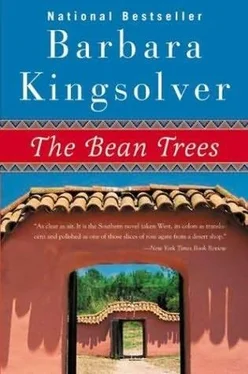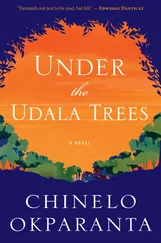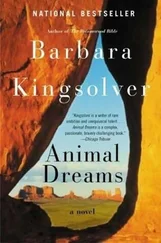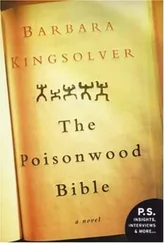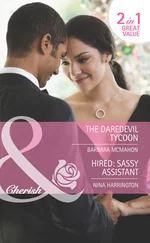“What’s miha?”
“Mi hija,” he pronounced it slowly.
“My something?”
“My daughter. But it doesn’t work the same in English. We say it to friends. You would call me mi’ijo.”
“Well, thank you for the compliment,” I said, “but that’s the biggest bunch of hogwash, what you said. When did I ever say anything poetic?”
“Washing hogs is poetic,” he said. His eyes actually twinkled.
His bus pulled up and he stepped quickly off the curb, catching the doorway and swinging himself in as it pulled away. That is just how he would catch a bus in Guatemala City, I thought. To go teach his classes. But he carried no books, no graded exams, and the sleeves of his pressed white shirt were neatly rolled up for a night of dishwashing.
I felt depressed that evening. Mattie, who seemed to know no end of interesting things, told me about the history of Roosevelt Park. I had just assumed it was named after one of the Presidents, but it was for Eleanor. Once when she had been traveling across the country in her own train she had stopped here and given a speech right from a platform on top of her box car. I suppose it would have been a special type of box car, decorated, and not full of cattle and bums and such. Mattie said the people sat out in folding chairs in the park and listened to her speak about those less fortunate than ourselves.
Mattie didn’t hear Eleanor Roosevelt’s speech, naturally, but she had lived here a very long time. Thirty years ago, she said, the homes around this park belonged to some of the most fortunate people in town. But now the houses all seemed a little senile, with arthritic hinges and window screens hanging at embarrassing angles. Most had been subdivided or otherwise transformed in ways that favored function over beauty. Many were duplexes. Lee Sing’s was a home, grocery, and laundromat. Mattie’s, of course, was a tire store and sanctuary.
Slowly I was coming to understand exactly what this meant. For one thing, people came and went quietly. And stayed quietly. Around to the side of Mattie’s place, above the mural Lou Ann and I called Jesus Around the World, there was an upstairs window that looked out over the park. I saw faces there, sometimes Esperanza’s and sometimes others, staring across the empty space.
Mattie would occasionally be gone for days at a time, leaving me in charge of the shop. “How can you just up and go? What if I get a tractor tire in here?” I would ask her, but she would just laugh and say, “No chance.” She said that tire dealers were like veterinarians. There’s country vets, that patch up horses and birth calves, and there’s the city vets that clip the toenails off poodles. She said she was a city vet.
And off she would go. Mattie had numerous cars that ran, but for these trips she always took the four-wheel Blazer and her binoculars, and would come back with the fenders splattered with mud. “Going birdwatching” is what she always told me.
After she returned, a red-haired man named Terry sometimes came by on his bicycle and would spend an hour or more upstairs at Mattie’s. He didn’t look any older than I was, but Mattie told me he was already a doctor. He carried his doctor bag in a special rig on the back of his bike.
“He’s a good man,” she said. “He looks after the ones that get here sick and hurt.”
“What do you mean, that get here hurt?” I asked.
“Hurt,” she said. “A lot of them get here with burns, for instance.”
I was confused. “I don’t get why they would have burns,” I persisted.
She looked at me for so long that I felt edgy. “Cigarette burns,” she said. “On their backs.”
The sun was setting, and most of the west-facing windows on the block reflected a fierce orange light as if the houses were on fire inside, but I could see plainly into Mattie’s upstairs. A woman stood at the window. Her hair was threaded with white and fell loose around her shoulders, and she was folding a pair of men’s trousers. She moved the flats of her hands slowly down each crease, as if folding these trousers were the only task ahead of her in life, and everything depended on getting it right.
True to his word, Angel came back. He didn’t come to move in, but to tell Lou Ann he was going away for good. I had taken Turtle for a doctor’s appointment so I didn’t witness the scene; all I can say is that the man had a genuine knack for dropping bombshells at home while someone was sitting in Dr. Pelinowsky’s waiting room. But of course, I had no real connection to Angel’s life. It was just a coincidence.
Turtle was healthy as corn, but as time went by I got to thinking she should have been taken to a doctor, in light of what had been done to her. (Lou Ann’s main question was: Shouldn’t you tell the police? Call 88-CRIME or something? But of course it was all in the past now.) I had thought of asking Terry, the red-haired doctor on the bicycle, but couldn’t quite get up the gumption. Finally I called for an appointment with the famous Dr. P., on Lou Ann’s recommendation, even though he wasn’t exactly the right kind of doctor. His nurse agreed that he could see my child this once.
We found the doctor’s office all right, but checking her in was another story. They gave me a form to fill out which contained every possible question about Turtle I couldn’t answer. “Have you had measles?” I asked her. “Scabies? Date of most recent polio vaccination?” The one medical thing I did know about her past was not on the form, unless they had a word for it I didn’t know.
Turtle was in my lap but had turned loose of me completely, since she needed both arms to turn through the pages of her magazine in search of vegetables. She wasn’t having much luck. Every other woman in that waiting room was pregnant, and every magazine was full of nursing-bra ads.
I knew how to trample my way through most any situation, but you can’t simply invent a person’s medical history. I went up and tapped on the glass to get the nurse’s attention. I saw that she was actually pregnant too, and I felt an old panic. In high school we used to make jokes about the water fountains outside of certain home rooms.
‘Yes?” she said. Her name tag said Jill. She had white skin and broad pink stripes of rouge in front of her ears.
“I can’t answer these questions,” I said.
“Are you the parent or guardian?”
“I’m the one responsible for her.”
“Then we need the medical history before we can fill out an encounter form.”
“But I don’t know that much about her past,” I said.
“Then you are not the parent or guardian?”
This was getting to be a trip around the fish pond. “Look,” I said. “I’m not her real mother, but I’m taking care of her now. She’s not with her original family anymore.”
“Oh, you’re a foster home.” Jill was calm again, shuffling through a new stack of papers. She blinked slowly in a knowing way that revealed pink and lavender rainbows of makeup on her eyelids. She handed me a new form with far fewer questions on it. “Did you bring in your DES medical and waiver forms?”
“No,” I said.
“Well, remember to bring them next time.”
By the time we got in to see Dr. Pelinowsky I felt as though I’d won this man in one of those magazine contests where you answer fifty different questions about American cheese. He was fiftyish and a little tired-looking. His shoulders slumped, leaving empty space inside the starched shoulders of his white coat. He wore black wing-tip shoes, I noticed, and nylon socks with tiny sea horses above the ankle bones.
Turtle became clingy again when I pulled off her T-shirt. She squeezed wads of my shirttail in both fists while Dr. Pelinowsky thumped on her knees and shined his light into her eyes. “Anybody home?” he asked. The only time she perked up at all was when he looked in her ears and said, “Any potatoes in there?” Her mouth made a little O, but then she spaced out again.
Читать дальше
